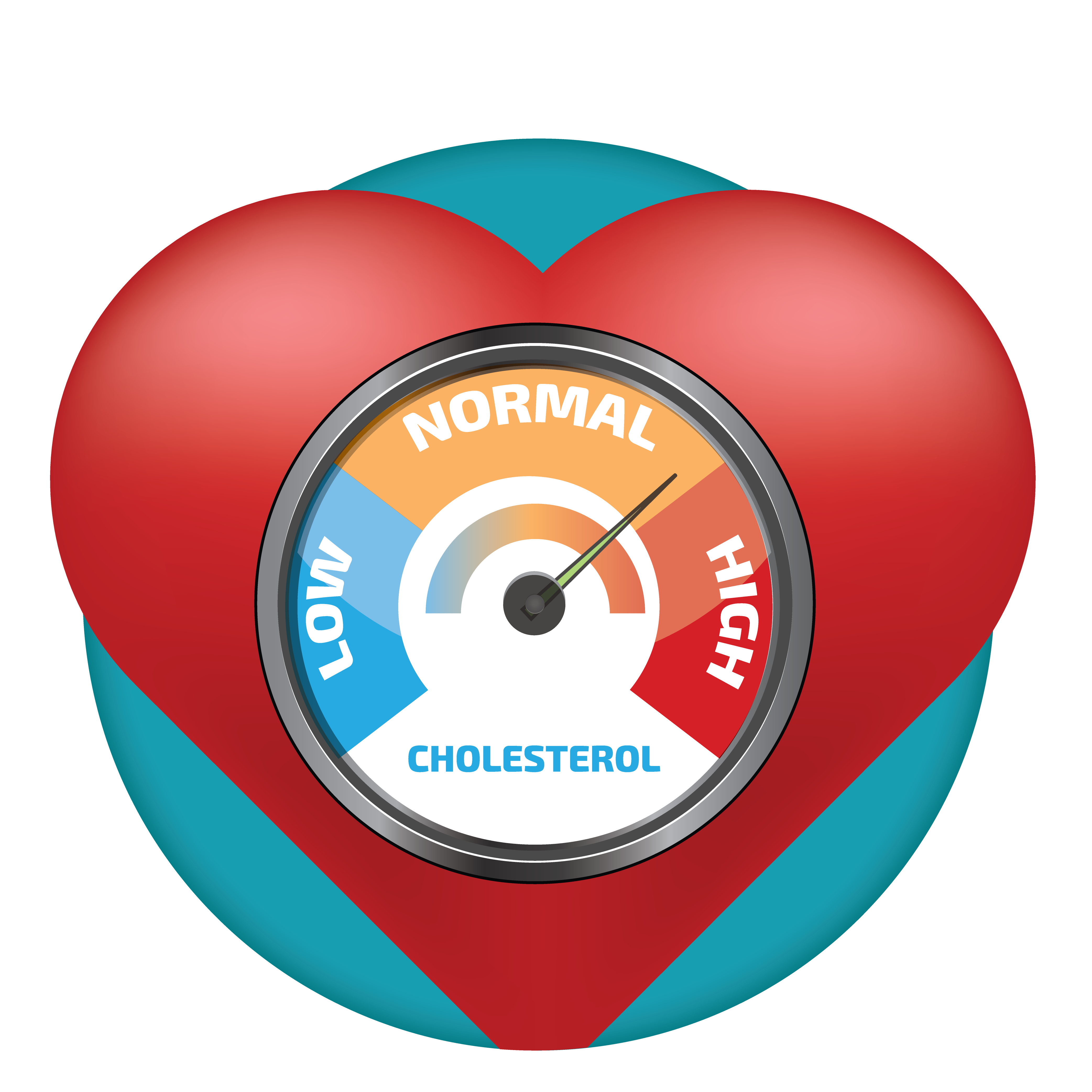High Cholesterol

Cholesterol is a waxy, fat-like substance that travels through the blood. In and of itself, cholesterol isn’t bad. It actually helps create the outer coating of our cells and aids the body in making vitamin D and certain hormones.
Your body makes the cholesterol it needs. But you also get it in your diet (for example, full-fat dairy products, fried foods and fatty meat). Too much cholesterol can be dangerous.
That’s because over time cholesterol and fat can build in the inner walls of the arteries that supply blood to the heart. This can cause a narrowing of the arteries (see atherosclerosis), which is a major cause of heart disease.
If you have high cholesterol, you’re certainly not alone. The good news is that high cholesterol is often preventable and treatable. Adopting a healthy diet, getting regular exercise and, in some cases, taking medication can go a long way to help lower your cholesterol and protect your heart.
Questions to Ask Your Doctor
Your health care team will work with you to help prevent or treat high cholesterol and support your overall cardiovascular health. Here are some questions you may want to ask:
- What is my cholesterol?
- What’s the difference between LDL cholesterol and triglycerides?
- Will exercise and diet alone be enough to lower my cholesterol?
- How does cholesterol relate to the risk of cardiovascular disease?
- How much exercise should I be getting? What types of activities are best for me?
- Are there foods I should avoid/eat more of?
- Do I need medication? If so, which medication and why?
- When can we expect to see a difference?
- What side effects should I watch for?
- I know statins are usually the first drug therapy, but what can you tell me about non-statin medications?
- I feel fine. Why do I need medicine to lower my cholesterol?
- What can I do to raise my “good” cholesterol?
- How often do I need to get my cholesterol level checked?
- What about my other risk factors for cardiovascular disease?
Living With High Cholesterol

If you have high cholesterol, you have a higher chance of developing heart disease, or having a heart attack or stroke. A heart-healthy lifestyle is especially important if you have high cholesterol. Find out what you can do to manage your cholesterol levels.
Overview
While our bodies need a certain amount of cholesterol to work properly, too much of the “bad” type can be dangerous. Over time, cholesterol and fat can collect in the inner walls of the arteries—including the ones that supply blood to the heart.
This buildup can cause atherosclerosis, a narrowing of the arteries and a major cause of cardiovascular disease. People with high levels of low-density lipoprotein (LDL), also called the “bad” cholesterol, are at greater risk for cardiac events.
Cholesterol is a waxy, fat-like substance that travels through the blood in carrier vehicles called lipoproteins. Cholesterol is in some foods we eat and is also made by the liver. It serves a variety of functions. For example, it helps create the outer coating of our cells and aids the body in making vitamin D and certain hormones.
Excess amounts of dietary fats get absorbed by the body and raise bad cholesterol in the blood.
Saturated and trans fats raise LDL cholesterol levels in the blood, thereby increasing the risk of heart disease. Foods that are high in animal fat (full-fat milk, cheese, meat) and/or prepared with butter, shortening or partially hydrogenated oils and sweets (cookies and cakes) are often the main culprits.
Signs and Symptoms
Many people don’t know that they have high levels of harmful cholesterol. That’s because there are usually no signs or symptoms associated with an early buildup of fatty plaques in the arteries.
Plaque is made up of cholesterol, fat and other substances. It’s not until there may be a significant blockage of the artery that someone might notice something is wrong. For example, they may have chest pain, pain in the arms or jaw, nausea, sweating, or shortness of breath—these usually occur when the blood supply to the heart is being slowed or blocked.
Unfortunately, these blockages can rupture and cause major problems, even when they are much smaller and without causing any early symptoms. That is why, for some people, the first sign of elevated cholesterol may be a heart attack or stroke.
So—even if you’re feeling good—it’s a good idea to get your cholesterol checked. Your doctor will consider your cholesterol numbers along with any other factors that make heart disease or stroke more likely to occur, such as your age, if you have diabetes or high blood pressure, of if you smoke.
What Increases Your Risk?
High LDL and total cholesterol are generally related to either genetics or poor lifestyle habits which include:
- Eating unhealthy fats and simple carbohydrates
- Not exercising regularly
- Being overweight or obese
- High blood pressure
- Diabetes
- Family history of early heart disease
- Low HDL levels
- Or if you are African American
Exams and Tests
It's important to track your cholesterol and risk for related heart disease, heart attack or stroke. A simple blood test—called a lipid panel—is used to check the amount of cholesterol in your blood.
Cholesterol is measured in milligrams (mg) per deciliter (dL) of blood—mg/dL in the United States. The test provides four measures:
- Total or overall cholesterol
- LDL, or “bad,” cholesterol
- HDL, or “good,” cholesterol
- Triglycerides
It’s important to track your cholesterol over time, especially because there are often no signs and symptoms of early buildup of fat and cholesterol in the artery walls.
Talk with your health care provider about how often your cholesterol should be checked and what numbers would be ideal for you.
Coronary Artery Calcium (CAC) Scoring
Coronary artery calcium (CAC) scoring, also called a coronary calcium scan, is a test that measures the amount of calcium in the walls of the heart’s arteries.
Most of the calcium in our body is found in our bones and teeth. It helps keep them strong and healthy. But calcium in the arteries that supply the heart with oxygen and nutrients can spell trouble for our heart health.
That’s because deposits of calcium in the coronary arteries are a sign that there may also be a buildup of plaque—a waxy substance that can harden over time and narrow or block the arteries (called atherosclerosis). When this happens, it makes a heart attack or stroke more likely.
So a coronary calcium scan is one way to estimate someone’s risk of developing heart disease or having a heart attack or stroke.
Treatment
Your treatment plan to lower your cholesterol numbers and help optimize your heart health will be based on your overall risk for cardiovascular disease. For example, a standard risk assessment would note whether you already have atherosclerosis or have a high chance of developing it. Recommended treatments will also depend on:
- Your cholesterol levels
- Other conditions you may have
- Previous treatments tried (if applicable)
- Personal choice
Trying to lower elevated levels of LDL often can be helped by making healthier lifestyle choices. In fact, the choices we make every day can affect our cholesterol.
Here are four things that can make a difference:
- Revamp the way you eat by following a heart-healthy plan such as the Mediterranean or DASH diets (these are less “diets” and more ways to adopt more healthy patterns of eating)
- Exercise regularly
- Stay at a healthy weight and lose any extra pounds
- Don’t smoke, and stay away from secondhand smoke
Many people with elevated LDL cholesterol also need to take medication.
Living With High Cholesterol
You probably know that fried chicken, a doughnut or a loaded double cheeseburger are not the best foods to put in your body. Why? Because foods like these are packed with unhealthy fats and lack many of the important nutrients for heart health.
The good news is that high cholesterol is often preventable and treatable. Studies show that keeping LDL low can not only prevent someone from developing clogged or narrowed arteries in the first place (primary prevention), but doing so also helps reduce the likelihood of a heart attack, stroke or related death among people who already have heart disease (secondary prevention).
The opposite is true, too: Those with high levels of high-density lipoprotein (HDL)—the “good” cholesterol—tend to have cleaner arteries and lower risk of heart attack and stroke. That’s because HDL acts like a scavenger, helping to find harmful cholesterol and remove it from your arteries.
The challenge is that there are often no signs or red flags of having too much bad cholesterol until it starts to affect your arteries. For this reason, it's important to know your cholesterol numbers and your related risk for developing heart disease, heart attack or stroke.
Increasingly, research shows that keeping LDL cholesterol levels low is an essential part of staying heart healthy. Adopting a healthy diet, getting regular exercise, keeping weight well managed and, in some cases, taking a medication, can go a long way to help.
How Cholesterol Factors Into Heart Risk
Managing cholesterol is an important part of staying heart healthy. When it comes to understanding the new cholesterol guidelines, experts say there are a few things to keep in mind:
Be sure to talk with your clinician about other health issues that worry you.
What You Can Do
- Ask about your 10-year risk score if you don’t already have heart disease
- Talk about other factors that might increase your risk (called “risk enhancers”)
- If there’s any doubt, ask if CAC scoring could help
- Have ongoing discussions about your risk for heart disease, heart attack or stroke keeping in mind risk and available therapies change over time
- If you are prescribed medication(s), take it as directed, and share any concerns before stopping.
- Stick to a heart-healthy lifestyle. Enlist your family and others to help support you.

Comments